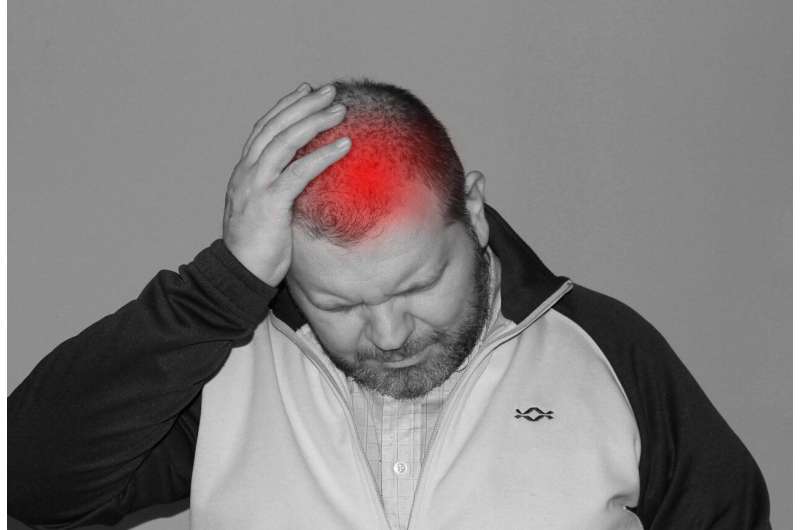This article has been reviewed according to Science X's editorial process and policies. Editors have highlighted the following attributes while ensuring the content's credibility:
fact-checked
peer-reviewed publication
trusted source
proofread
Not just a headache: Migraines can cause significant disability

More than a quarter of people who live with migraine disease say the condition has caused them to miss school or work for more than five days over a three-month period, a survey from the University of Otago, Wellington, and the Migraine Foundation Aotearoa New Zealand has found.
Half of the 530 people who responded to the survey said they had been unable to do household work, and nearly a third had missed family, social or leisure activities during the period. Almost half met the criteria for severe disability.
It is the first reported survey of people living with migraine in Aotearoa New Zealand. The findings are published in the New Zealand Medical Journal today.
Lead researcher Dr. Fiona Imlach, a Senior Research Fellow at the University's Department of Public Health and co-founder of the Migraine Foundation, says migraine is causing significant levels of disability among New Zealanders, impacting their physical and mental health, their ability to work and socialize, and their family lives.
One in seven people worldwide experience migraine, with the disease affecting two to three times as many women as men. More than 640,000 Kiwis are thought to live with the condition.
Nearly a quarter of those who responded to the survey (23%) had chronic migraine, experiencing headache on 15 or more days a month—the highest level of disability and impairment. Of these, 20% had continuous or nearly continuous headache (5% of all respondents) and another 22% had 24 or more days of headache per month (5% of all respondents).
Those who completed the survey spoke of living with significant levels of pain which could last for hours or days. One commented, "People don't understand the excruciating pain and think, 'it's just a headache.' I've pondered if I could just cut my own head off to make it stop."
The migraine attacks were sometimes accompanied by debilitating and distressing symptoms, such as loss of coherent speech, paralysis on one side of the body, nausea and vomiting, visual disturbance and even loss of vision, and sensitivity to sounds, light, smell and touch.
Co-researcher Sue Garrett, a Senior Lecturer in the University's Department of Primary Health Care and General Practice, says migraine is leading to anxiety and depression, with people using words such as 'misery' and 'devastating' to describe the impact of the condition, and talking of it 'ruining' their lives.
"Those living with chronic migraine describe only living half a life, of feeling isolated, trapped, lonely and useless. A common theme was the feeling that migraine was 'stealing (their) life away.' People talked of 'lost days' and time they could never get back."
Some said they could not work or study because of the need to lie still in bed for several days until their migraine attack passed, while others said they were unable to function productively at work because of cognitive impairment and fatigue.
Of those who could work, some said they relied on acute pain medication to get through, or mentioned being lucky to have flexible work schedules so they could reduce their hours of work when they needed to.
Dr. Imlach says despite almost half of the people with migraine meeting the criteria for severe disability, there was very limited financial support available to them through unemployment or disability benefits. Ministry of Social Development data from June 2022 shows only 0.3% of working-age people on a Jobseeker or disability benefit had migraine listed as a condition that limited their ability to work.
"This is surprising, considering how common migraine is and that the majority of survey respondents reported that migraine negatively impacted their ability to work. In fact, 29% said they either couldn't work, or could only work part time," says Dr. Imlach.
Dr. Imlach says although migraine is a neurological condition with a genetic basis that cannot currently be "cured," many respondents spent large amounts of effort, time, research and money searching for a cure or ways to reduce the frequency or intensity of migraine attacks.
"People want to know what causes or triggers an attack and try all sorts of diets and restrictions. However, the research now suggests that many of the things that were thought to trigger migraine attacks, such as certain foods like cheese or chocolate, bright lights, noise or strong smells, are more likely to be early symptoms of an impending attack," she continues.
"We would like it to be easier for people to access evidence-based treatments and be able to put into practice all those healthy routines around eating well, getting enough sleep and exercising regularly that are especially important for people with migraine."
She says poor understanding of the condition is leading to stigma and increasing the level of disability among people with migraine, noting, "It is a complex condition, and greater support and awareness of migraine as more than 'just a headache' is needed, both among the public and in workplaces. Recognizing migraine as a disability would allow those unable to work to access benefits and get financial support for treatment costs while more supportive work practices would reduce work-related stress and improve productivity."
Dr. Imlach says more research is needed to understand the social and economic cost of migraine in Aotearoa New Zealand, including its impact on health services and the benefits of improved access to better treatment options.
"Globally, it is recognized that migraine has been under-researched and underfunded for many decades, but things are improving in other countries. It's time New Zealand caught up," she concludes.
More information: Susan Garrett et al, The impact of living with migraine disease in Aotearoa New Zealand, New Zealand Medical Journal (2024). DOI: 10.26635/6965.6432





















